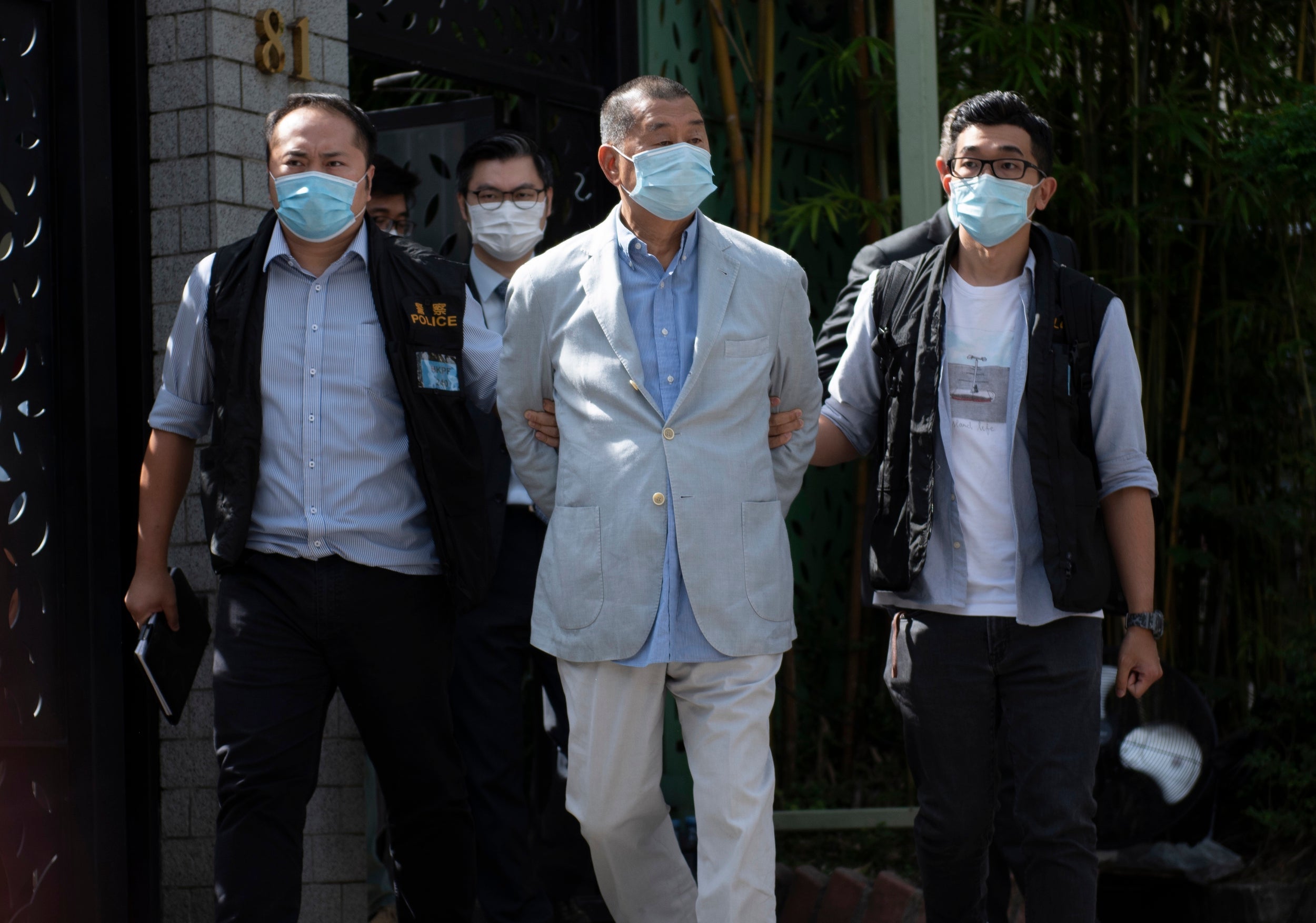Jimmy Lai: Hong Kong media tycoon arrested for ‘foreign collusion’ under new security law
Owner of pro-democracy Apple Daily tabloid becomes most high-profile suspect arrested so far under controversial new national security law

Your support helps us to tell the story
From reproductive rights to climate change to Big Tech, The Independent is on the ground when the story is developing. Whether it's investigating the financials of Elon Musk's pro-Trump PAC or producing our latest documentary, 'The A Word', which shines a light on the American women fighting for reproductive rights, we know how important it is to parse out the facts from the messaging.
At such a critical moment in US history, we need reporters on the ground. Your donation allows us to keep sending journalists to speak to both sides of the story.
The Independent is trusted by Americans across the entire political spectrum. And unlike many other quality news outlets, we choose not to lock Americans out of our reporting and analysis with paywalls. We believe quality journalism should be available to everyone, paid for by those who can afford it.
Your support makes all the difference.The Hong Kong media tycoon and pro-democracy activist Jimmy Lai has been arrested on suspicion of foreign collusion, becoming the most high-profile figure yet detained under a controversial new national security law.
Lai is the founder of the pro-democracy tabloid Apple Daily, and has repeatedly criticised authoritarian moves by Beijing to diminish Hong Kong’s autonomy.
Police also raided the offices of Apple Daily following Lai’s early morning arrest, and several other executives in Lai’s Next Media company were also detained.
The newspaper shared a live-stream on its website of officers questioning members of staff and rifling through documents at its headquarters. “We see this as straight harassment,” an Apple Daily source told the Reuters news agency.
It wasn’t immediately clear what Lai was being accused of. He was called a “traitor” by Communist Party officials for travelling to the US for a White House meeting with the vice president, Mike Pence, and secretary of state, Mike Pompeo. They discussed controversial legislation – since withdrawn and superseded by the security law – that would have allowed criminal suspects to be extradited to mainland China.
In May, shortly after Beijing announced its intention to pass the national security law in Hong Kong, Lai wrote an op-ed for The New York Times saying China was repressing Hong Kong with the legislation.
“I have always thought I might one day be sent to jail for my publications or for my calls for democracy in Hong Kong,” Lai wrote.
“But for a few tweets, and because they are said to threaten the national security of mighty China? That’s a new one, even for me,” he said.
Lai has already been arrested twice this year, in February and in April, accused of taking part in unauthorised protests. After being taken from his Kowloon mansion to the Apple Daily offices in handcuffs, the 71-year-old said: “We can’t worry that much, we can only go with the flow.” He was then escorted into a police vehicle.
“We are completely shocked by what’s happening now, with the arrest and followed by the ongoing raid inside the headquarters of Next Digital,” said Chris Yeung, chair of the Hong Kong Journalists Association.
“With the passage of the national security law and the really tough powers given to the police in their operations, we have seen now what we call ‘white terror’ become a reality, which will affect media organisations and journalists’ reporting.
“I think somewhere in third-world countries there has been such kind of press freedom suppression; I just didn’t expect it in Hong Kong.”
The arrest “bears out the worst fears that Hong Kong’s national security law would be used to suppress critical pro-democracy opinion and restrict press freedom”, said Steven Butler, the Committee to Protect Journalists’ Asia programme coordinator. “Jimmy Lai should be released at once and any charges dropped.”
The law is vague in its definition of foreign collusion, as well as in the way it bans sedition, subversion and terrorism.
It has already had a chilling effect on pro-democracy activism in the city, with political groups disbanded and several high-profile campaigners fleeing abroad.
On Friday, the US imposed sanctions on Hong Kong’s leader Carrie Lam and other top officials for allegedly curtailing political freedoms in the territory – the government first banned a list of candidates from running in a September election and then postponed it altogether, citing coronavirus concerns.
But the sanctions have drawn a mix of mockery and condemnation from Beijing, with one official suggesting it showed they were doing what was right for Hong Kong and China.
Lai’s arrest reflected that Hong Kong “wasn’t intimidated” by the US sanctions, said the Global Times editor Hu Xijin in a tweet. The Global Times is published by China’s official Communist Party newspaper, the People’s Daily.
Join our commenting forum
Join thought-provoking conversations, follow other Independent readers and see their replies
Comments